
Menstrual Cycle Phases: How Do They Affect Your Immunity?
By now, you likely know that the menstrual cycle is much more than just a period.
In fact, the period — aka menstruation, Code Red, girl flu, and shark week — is just the first phase of the cycle.
The menstrual cycle is made up of four phases that interact and overlap, happening in both the ovaries and the uterus. But did you know that your menstrual cycle also affects your body’s immune system?
We're not saying that the reproductive and immune systems are directly connected, because they're not. Still, the fluctuation of hormones throughout the cycle can have certain immune repercussions.
Not only that, but the added inflammation that goes hand-in-hand with certain phases (hello cramps, bloating, and acne) can also be related to the immune system. You see, any inflammation that happens in the body is a result of an activated immune system.
Interested in learning more? We can help. Read on as we explore the relationship between menstruation and immunity to discover the link.
How Is My Period Related to My Immune System?
Your immune system is the basis of your health. It works for you most of the time by fighting off foreign invaders that cause infection, disease, and illness.
However, sometimes your immune system works against you, causing or influencing chronic conditions like arthritis and allergies.
That said, sex hormones — such as progesterone, estrogen, and testosterone — seem to affect the immune system and its overall function. In fact, according to one recent study conducted at Oxford University, researchers found that when estrogen levels drop during ovulation, immunity is somewhat suppressed.
This is likely because the sex hormone progesterone wants to encourage pregnancy, while the immune system wants to fight off all foreign invaders in the body — in other words, your immune cells try to attack a fertilized egg (the invader) as progesterone works to stop them. This all contributes to the ability to conceive around ovulation.
So, depending on where you are in your cycle and what hormones are hard at work, research shows that you may be more susceptible to getting sick at certain times.
We know, mind blown.
How Can the Menstrual Cycle Influence Immunity?
On average, women experience a visit from their dear ol' Auntie Flo according to a 28-day cycle, though it's perfectly normal for it to be shorter or longer for some people. After all, everyone is different!
As mentioned earlier, the different phases of the menstrual cycle are defined by changing levels of hormones in the body. These all-important hormones help prepare the uterus (womb) and egg that is maturing in the ovaries for possible fertilization and pregnancy.
The hormones that are especially important in a women's menstrual cycle include:
- Follicle Stimulating Hormone (FSH) — This hormone stimulates ovarian follicles to grow. A follicle (or fluid sac) is a tiny sac that contains a developing egg.
- Luteinizing Hormone (LH) — This hormone peaks right before ovulation and sends a signal to the dominant follicle to release an egg.
- Estrogen — This essential hormone is produced by the growing follicles in the ovaries. It tells the uterine lining to grow in preparation for potential egg fertilization.
- Progesterone — Also produced by the ovaries, this hormone helps to keep the uterine lining ready for possible embryo implantation.
The Menstrual Phase
The very first day of menstrual bleeding is considered day one of your cycle. On this day, the hormone progesterone plunges, causing the uterine lining to shed — aka, your period. On average, a period lasts between three and seven days.
When you're actually on shark week, hormone levels are low because they've already done the grueling work of thickening the uterine lining and signaling for menstruation to begin. In other words, your hormones are tired and need to take a breather.
This dip in hormones can leave you feeling tired and withdrawn. What's more, menstruation itself is linked to increased inflammation which causes the immune cells to function at a lower level. And when your immune system isn't functioning as it should, your body can become more susceptible to catching a bad bug.
To support your immune system and keep illness at bay, we suggest taking a daily multivitamin — like Daily Love Multivitamin + XOmegas. This powerful vitamin is made with a full-spectrum 25+ vitamins and minerals for your baseline nutritional needs, plus special nutraceutical ingredients that support immunity, stress, sexual wellness, and more.*
The Follicular Phase
Once your Auntie Flo hits the road, your body enters the follicular phase, where your ovaries prepare for the release of an egg. As this happens, levels of estrogen increase to thicken the uterus lining for a potential pregnancy.
Thanks to this increase of estrogen, you may feel full vibrant, and full of energy. Your immune system may be stronger, too.
In general, women have higher immunity than men because of how estrogen impacts their bodies. However, this essential hormone can also have the opposite effect on the immune system and cause those with high levels of estrogen to become more prone to autoimmune disorders or flare-ups from an underlying chronic condition.
Ovulation
During ovulation, one of the ovaries releases an egg in preparation for a possible pregnancy, and you experience an LH surge. In addition, estrogen levels dip— along with your immune system.
Research suggests that this lowered immunity might happen to allow foreign cells (aka sperm) to enter the body. Basically, your sex hormones are telling your immune cells not to attack a possibly fertilized egg.
While the evidence remains inconclusive, women who menstruate may be more likely to experience vaginal infections (such as bacterial vaginosis) mid-cycle. You may want to take extra care to get enough sleep, water, and probiotics to optimize your vaginal health and wellbeing.
We also recommend taking Perfect Condition Vitamin — the vitamin for your vagina that you didn't know you needed!
This innovative formula is masterfully made with grapefruit, folic acid, and coconut oil to support a healthy balance of Candida yeast system-wide (from the gut to the vaginal tract). It also contains clean ingredients like turmeric and garlic that work together to support normal detoxification and immunity.*
Luteal Phase
The luteal phase is the week or so leading up to your monthly bleed. During this premenstrual phase, your body starts to prepare itself for the stress of menstruation, which often manifests in flu-like symptoms such as a case of the sniffles, body aches, and fatigue.
The rise in progesterone during this phase is also notoriously known to make you moodier or more tense. Given that cortisol (the stress hormone) is connected to inflammation, your immune system is also feeling stressed by having to work harder to stay in tip-top shape.
What's more, high progesterone levels tend to lower your immune system's ability to fight infections that can affect your reproductive, gastrointestinal, and respiratory tracts. These icky PMS symptoms often impact your energy, mood, and skin, along with the not-so-wonderful symptoms often mistaken for a cold or flu.
A Final Word
Understanding menstruation and how it impacts your immunity can help you feel your best regardless of where you are in your cycle.
With that in mind, it’s always a good idea to track your menstrual cycle and symptoms. Whether it’s in a journal or through an app, you’ll likely begin to notice patterns that are unique to your body. This can help you determine if that random case of the sniffles is due to your upcoming period or something more serious.
Here at Love Wellness, we focus on women’s care guided by doctors. Our products range from ingestible beauty to digestion products and just about everything in between.
Whether you’re on a mission to find the best gut-lovin’ probiotics on the planet or simply trying to support your vaginal health with a pH Balancing Cleanser, you can count on us to have clean female-friendly products that are second-to-none.
Sources:
Is Female Health Cyclical? Evolutionary Perspectives on Menstruation | BibSonomy
The Normal Menstrual Cycle and the Control of Ovulation | NCBI
Shop Our Founder's Favorites Wellness Products
-
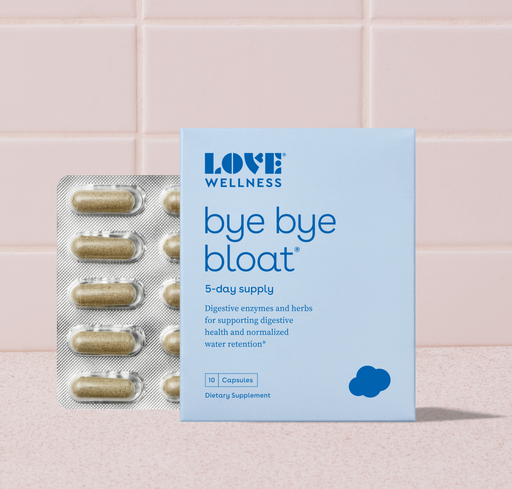 NEW!
NEW!Bye Bye Bloat® Travel Size
Alleviates bloating fast*
$8.99 One-time PurchaseA blend of digestive enzymes and herbs that alleviates bloating fast.* - Gluten-Free & Dairy-Free - Take 1-2 capsules after a meal or before b...
View full details -
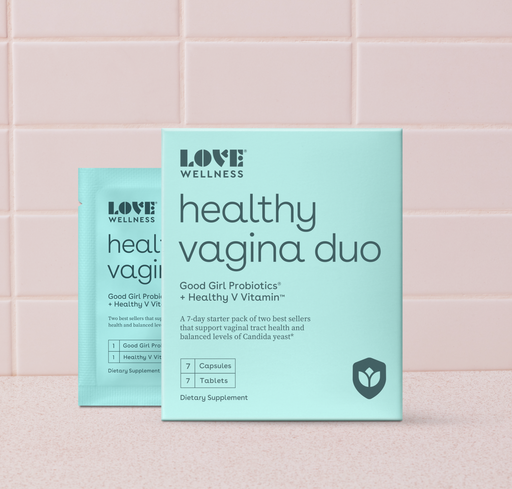 NEW!
NEW!Healthy Vagina Travel Kit
Supports vaginal & urinary tract health*
$16.99 One-time Purchase- 7-day supply — perfectly sized to take on the go so you can keep your routine up when you’re not at home! - Good Girl Probiotics®: Helps to maint...
View full details -
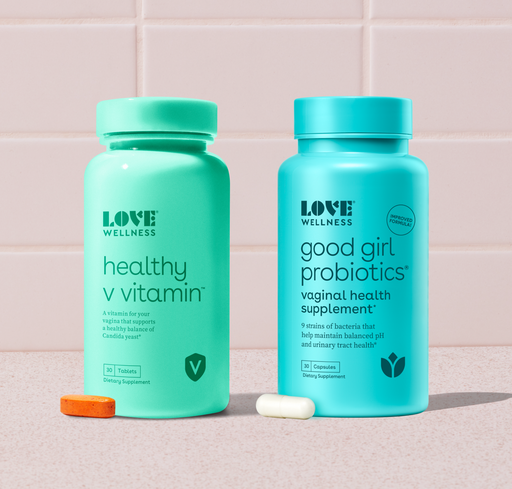

Healthy Vagina Bundle
Supports vaginal & urinary tract health*
$35.24 Subscribe & Save$46.99 One-time PurchaseFor vaginal & urinary tract health. HOW IT WORKS Together, this powerful duo supports your vaginal health by balancing bacteria and yeast. Go...
View full details -
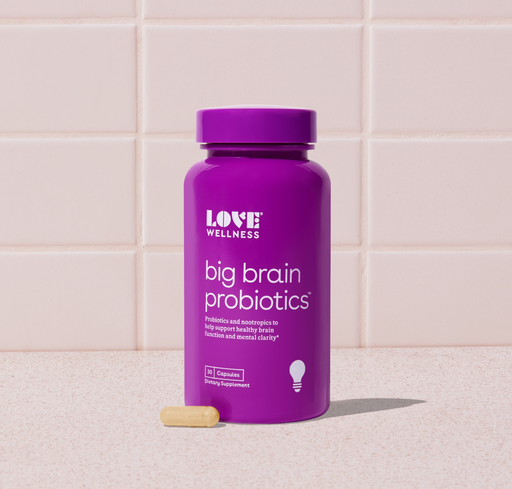
Big Brain Probiotics®
Helps support brain function*
$22.49 Subscribe & Save$29.99 One-time PurchaseA blend of probiotics and nootropics to help support brain function, cognitive health, and help maintain a healthy mood and sense of calm.* - Vegan...
View full details -
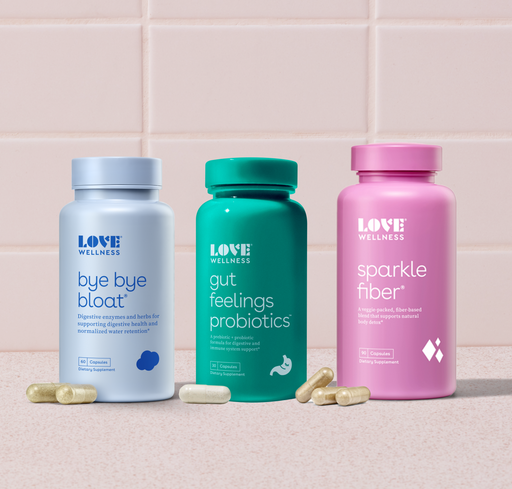

Bloating Bundle
Helps boost your gut health*
$54.74 Subscribe & Save$72.99 One-time PurchaseBeat bloat with this combo of fiber, digestive enzymes, and probiotics that naturally boost your gut health.* gut, bloating, gas, reflux, probiot...
View full details -
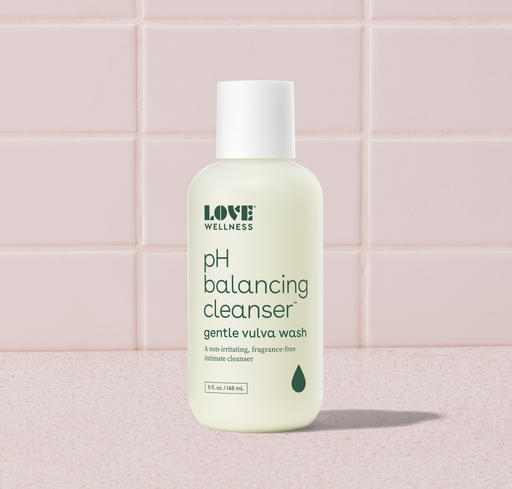
pH Balancing Cleanser™
Gently cleanses your vulva
$11.24 Subscribe & Save$14.99 One-time PurchaseA fragrance-free, gentle cleanser for your vulva to help maintain a balanced vaginal microbiome. - Gluten-Free, Dairy-Free, Vegan - Apply to wet s...
View full details -
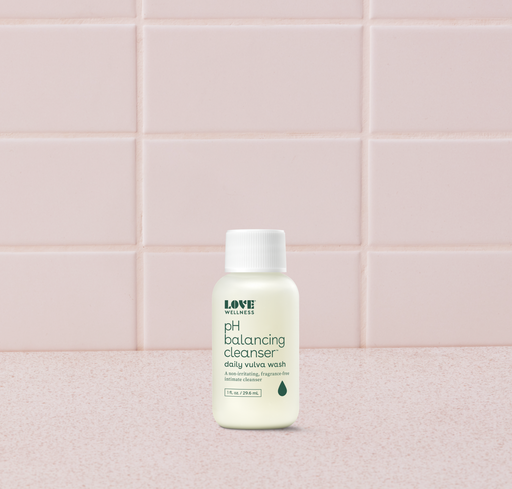 NEW!
NEW!pH Balancing Cleanser™ Travel Size
Gently cleanses your vulva
$4.99 One-time PurchaseA fragrance-free, gentle cleanser for your vulva to help maintain a balanced vaginal microbiome. - Gluten-Free, Dairy-Free, Vegan - Apply to wet s...
View full details -
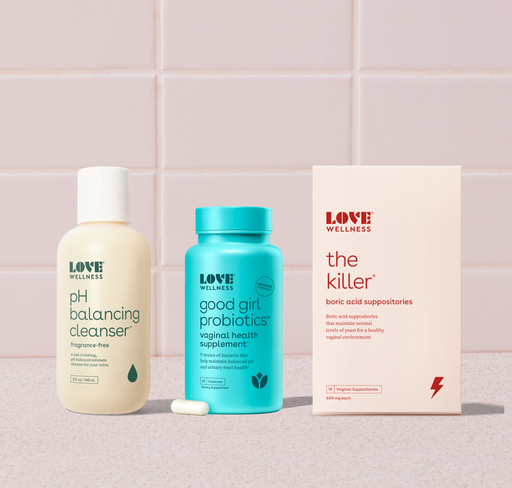

Vaginal pH Bundle
Three, must-have products to keep your pH balanced.
$40.49 Subscribe & Save$53.99 One-time PurchaseThree, must-have products to keep your pH balanced: a daily vaginal probiotic, a fast-acting suppository, and a fragrance-free vulva cleanser.*








